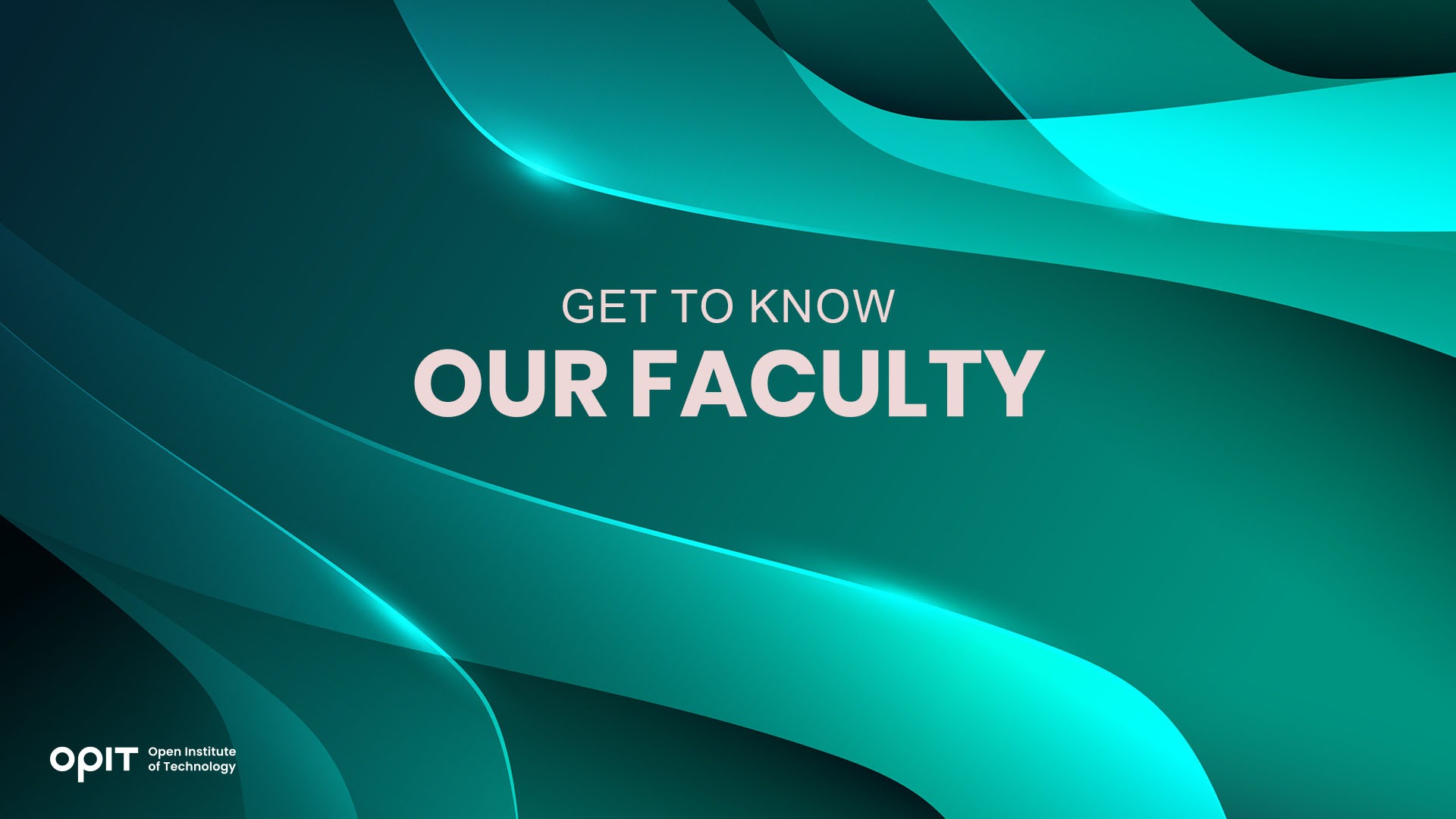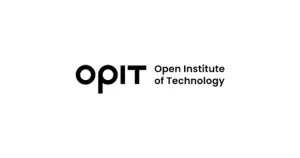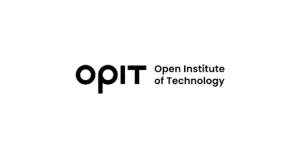

At the Open Institute of Technology (OPIT), we have a simple goal – to provide high-quality yet accessible education in the technology field. But for our courses to be high-quality, the professors behind them must be equally exceptional.
And they absolutely are.
The OPIT professors are paragons of expertise and passion. Each professor has been handpicked for their profound understanding of technology, coupled with extensive academic achievements and industry experience. That’s why these architects of knowledge bring both theoretical depth and real-world insights into every class at OPIT.
So, what better way to get to know our world-class OPIT faculty than to hear their thoughts on the topics they’re passionate about? In this article, you’ll read what five of our top-notch faculty members have to say about tech innovations transforming the world. Of course, you’ll also get a quick overview of other members of our inspiring faculty shaping the next generation of leaders in technology and digital space.
The OPIT Faculty at a Glance
Before diving into our faculty members’ fascinating biographies and insights, let’s take a moment to appreciate the diverse expertise that forms the backbone of OPIT.
Our faculty is a mosaic of over 30 accomplished professionals from all over the world, each bringing a unique perspective to the table.
And that’s the beauty of online learning. How else would you be able to connect with experts spanning the globe, all from the comfort of your own home?
Our inspiring faculty comes from over 15 countries and four continents. The U.S., Canada, Brazil, Lebanon, Germany, France, India and Italy are just some of the nations represented. This collage of diverse backgrounds (and experiences) ensures that your education at OPIT transcends geographical boundaries, offering a truly global perspective on technology.
Meet the OPIT Faculty at the Forefront of Technology
Now that you have a better idea of the diverse expertise within our faculty, let’s introduce you to the brilliant minds at the forefront of technology education at OPIT. This time, we asked five of our esteemed faculty members how recent tech innovations have transformed the world. Here are their answers.
Raj Dasgupta, Ph.D.
Professor Raj Dasgupta is an impressive individual in every regard. He’s currently a research scientist at the U.S. Naval Research Laboratory after teaching computer science for almost 18 years at the University of Nebraska. His research projects have been funded by the U.S. Department of Defense and NASA, and he has earned a Ph.D. in Computer Engineering from the University of California. Talk about a multifaceted professional!
At OPIT, Professor Dasgupta teaches Data Structures and Algorithms, Reinforcement Learning, and Introduction to Artificial Intelligence in the Bachelor of Science in Modern Computer Science program. The last subject is also a part of the Bachelor of Science in Digital Business program. He also teaches Machine Learning in the Responsible Artificial Intelligence program.
When asked about the transformative impact of tech innovations, Professor Dasgupta singled out the brain-computer interface (BCI) system as the technology that fascinates him the most. He explains, “We have been able to link the human thought, the human brain, with these assistive devices.” This connection means that these BCI systems can extract (and use) any thoughts from people who can’t speak for themselves or express their thoughts. As Professor Dasgupta puts it, all it takes is for them to “just think what they want to do.”
Santhosh Suresh, Ph.D.
With giants like PayPal, Meta, and McKinsey & Company on his resume at a young age, it’s evident that Professor Santhosh Suresh possesses remarkable expertise in business problem-solving. Business Problem Solving is precisely the subject he teaches at OPIT’s Master of Science in Applied Data Science & AI and Applied Digital Business programs.
So, it’s no wonder his answer to our question also focuses on solving problems, this time with technology. He rejoices at the fact that the ultimate knowledge is no longer reserved only for the rich and privileged. Thanks to advanced data science-based algorithms, “the efficiency of airlines or railroads or how we do operations in the surgery room has gone up exponentially, and that is improving the quality of lives of millions if not billions of people.”
Paco Awissi, MBA
A data science leader. An analytics expert. A machine learning practitioner. These are just some of the impressive attributes that define Professor Paco Awissi’s career. These flattering attributes also landed him the coveted positions of Vice President of Data and Reporting at Morgan Stanley, Lead Instructor at McGill University School of Continuing Studies, and, of course, Professor at OPIT.
Professor Awissi teaches three courses in our Master of Science in Applied Data Science & AI program – Project Management, Applications in Data Science and Artificial Intelligence (Part 2), and Business Communication.
When asked about new tech advancements, he also focuses on AI, explaining that the technology is revolutionizing “risk management, fraud detection, and personalized financial services.” Professor Awissi adds that AI is also used in “algorithmic trading, credit scoring, and automating customer service through chatbots, which improves the efficiency and inclusiveness of financial services.”
Filip Biały, Ph.D.
Professor Filip Biały comes from Poland, where he has taught at the Adam Mickiewicz University in Poznan for over 15 years. When it comes to Professor Biały, it’s hard to tell whether he has more education or experience in computer science and artificial intelligence.
However, his main goal is to understand the consequences of AI for democratic politics, which is why he also emphasizes that the negative impact of digital technologies shouldn’t be overlooked. As for the positive sides of this life-changing technology, Professor Biały says that it is “essential in improving the efficiency of business processes and advancing research, for example, in discovering new drugs.”
At OPIT, you can listen to Professor Biały’s fascinating insights in the Bachelor of Science in Modern Computer Science and Digital Business programs (ICT Fundamentals, Web Development, and Ethics of Computer Science & AI courses).
Tom Vazdar, Ph.D.
Like his colleague, Professor Tom Vazdar also primarily focuses on the negative implications of technological advancements. As a current AI and Cybersecurity Strategist of a boutique consulting firm and the former Chief Security Officer at Erste Bank Croatia, he knows just how important cybersecurity is and how dangerous technological progress can be without adequate safeguards.
That’s why he’s the expert OPIT put in charge of its latest Master of Science program – Enterprise Security. OPIT has worked closely with Professor Vazdar to develop this program and equip students with the most in-demand technical, managerial, and soft skills.
Professor Vazdar also teaches Introduction to Computer Security in the Modern Computer Science and Digital Business programs, as well as Behavioral Cybersecurity in the abovementioned Enterprise
Security program.
Meet More OPIT Faculty Members Helping You Succeed
If you apply to OPIT, you’ll get the unique chance to learn from the very best from all over the world. But until then, you can hear more intriguing perspectives from our faculty members. Visit the Faculty section of our website to get a sneak peek of the incredible expertise and global perspectives that shape OPIT.
The professors at OPIT have either taught at prestigious universities or have a long and impressive history in the industry. For the former, our professor’s biographies are adorned with institutions like the University of Copenhagen, the University of Rome, the Italian Institute of Technology, and the University of Stuttgart.
As for the latter, Microsoft, Meta, Symantec, and UBS are just some of the world-famous companies where our faculty members have left a lasting impact. The same goes for institutions like the Europol, the European Parliament, and the European Investment Bank (EIB).
Though our faculty members come from different corners of the world, they all share a common goal – a relentless pursuit of knowledge. By learning from these top-notch professionals, you’ll get an insight into decades of cutting-edge research, industry collaboration, and real-world experience. This knowledge and the skills you acquire at OPIT will help you play a leading role in the technological revolution, just like your professors.
Related posts


Source:
- Il Sole 24 Ore, published on June 23rd, 2025
At its core is a teaching heritage made up of 131 courses, 3,500 hours of video, 1,800 live sessions
Have questions?
Visit our FAQ page or get in touch with us!
Write us at +39 335 576 0263
Get in touch at hello@opit.com
Talk to one of our Study Advisors
We are international
We can speak in:


